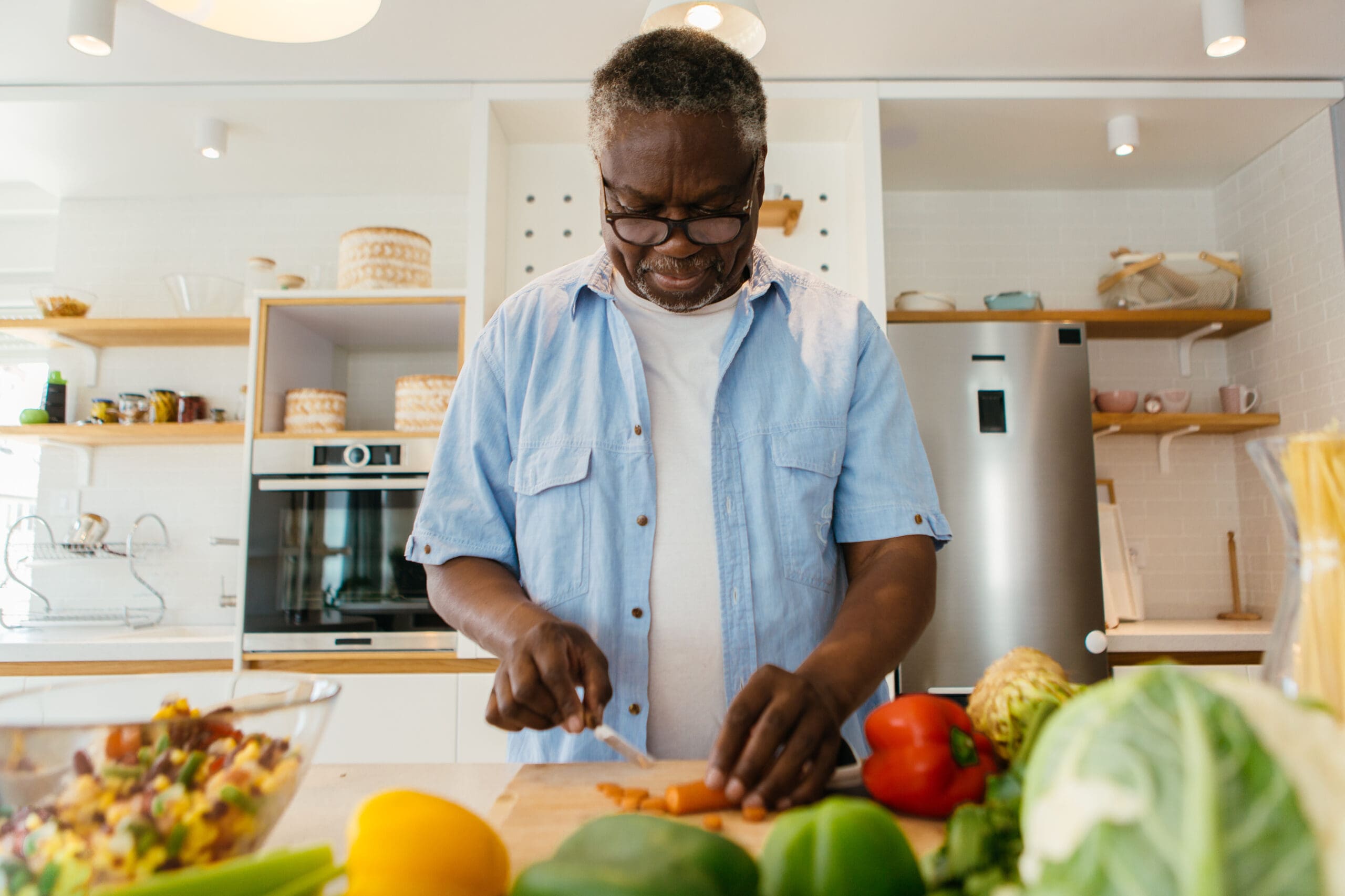
A prostate cancer diagnosis can feel like being handed a script written without you. For Black men, it often arrives with limited choices, delayed detection, and unanswered questions. One of the most common questions that follows is whether food can actually make a difference.
The answer is not simple, but it is evolving. While no single ingredient can stop cancer, research continues to show that diet may influence how prostate cancer behaves, especially in its early stages. In a healthcare system that often misses the mark for Black men, food offers a way to take back some control.
Table of Contents
What the MEAL Study Taught Us
The Men’s Eating and Living (MEAL) study was one of the first large-scale trials to explore whether increasing vegetable intake could influence prostate cancer progression. Men with early-stage prostate cancer were randomized to receive counseling aimed at raising their vegetable consumption to at least seven servings per day, with a focus on cruciferous and carotenoid-rich vegetables. The control group received written dietary guidance without structured support.
After two years, researchers found no significant difference in tumor progression. However, the study demonstrated that men can change how they eat and maintain those changes. That foundation has shaped newer studies with stronger outcomes.
What We Know Now About Diet and Prostate Cancer
Recent research from Johns Hopkins has added clarity to how diet may shape prostate cancer outcomes. In a study of 886 men with low-grade prostate cancer on active surveillance, researchers found that those with higher Healthy Eating Index scores were less likely to see their cancer progress. For every 12.5-point increase in HEI score, the risk of moving to a more aggressive stage dropped—15 percent for grade group 2, and 30 percent for grade group 3.
The Healthy Eating Index is a way to measure how well someone’s diet aligns with national nutrition guidelines. It doesn’t require strict meal plans or expensive ingredients. Instead, it favors everyday foods that support the body and reduce inflammation. That can include familiar staples like collards, black-eyed peas, sweet potatoes, okra, brown rice, and leafy greens. It’s not about cutting everything out. It’s about building meals that work with your body, not against it.
Foods That Support Prostate Health
Certain foods may help the body respond better to prostate cancer. They won’t cure it, but they can support your health in ways that matter.
Tomatoes, especially when cooked, release a compound called lycopene. It’s an antioxidant that may help slow cancer growth. Think tomato sauce, stews, or roasted tomatoes. Heat makes it easier for your body to absorb and use.
Vegetables like broccoli, cauliflower, and Brussels sprouts contain natural chemicals that help clear out toxins. These are easy to steam, sauté, or toss into a stir-fry.
Fish like salmon, sardines, and mackerel are rich in healthy fats that calm inflammation. Two servings a week is a good place to start.
Green tea and pomegranate juice are packed with antioxidants that may help protect prostate cells. Some studies suggest they can help lower PSA levels, which is one way doctors track prostate cancer. PSA stands for prostate-specific antigen, a protein made by the prostate. When levels rise, it can be a sign that cancer is growing or becoming more aggressive.
Pumpkin seeds offer zinc, which supports prostate function. They’re easy to sprinkle on oatmeal, salads, or roasted vegetables.
Berries such as blueberries, raspberries, and strawberries are full of nutrients that fight stress in the body. Fresh or frozen, they’re simple to add to breakfast or snacks.
Leafy greens like spinach and kale help reduce inflammation and support overall health. You can blend them into smoothies, cook them down with garlic, or serve them with grains.
For a more detailed breakdown of foods to eat and avoid, explore the University of California, San Francisco’s Diet Recommendations Pamphlet.
Why This Matters for Black Men
Black men are more than twice as likely to die from prostate cancer as white men. According to the American Cancer Society’s 2025 report, they face a 16 percent higher mortality rate despite only a 4 percent higher incidence. This gap reflects systemic failures in early detection, access to guideline-based care, and inclusion in clinical trials.
Between 1991 and 2022, cancer mortality among Black men aged 40 to 59 declined by up to 67 percent. That progress is real, but it is not universal. It stems from reduced smoking rates and treatment advances, not from structural change. Black men continue to be diagnosed later, treated less aggressively, and excluded from the research that shapes care.
Lifestyle shifts offer a form of agency in a system that rarely prioritizes Black health. Food is not a replacement for treatment, but it can be a powerful ally.
Steps You Can Take Today
If you or someone you love is navigating prostate cancer, here are shifts worth considering:
- Add fatty fish like salmon or sardines twice a week.
- Use olive or avocado oil instead of seed oils.
- Incorporate beans, lentils, and whole grains regularly.
- Cut back on fried and ultra-processed foods.
- Include cooked tomatoes, cruciferous vegetables, and berries in weekly meals.
- Sprinkle in flaxseed or chia for plant-based omega-3s.
Always consult your care team before starting supplements or making major dietary changes.
Changing your diet will not erase a diagnosis. But it can support your body, your treatment, and your future. For Black men facing higher risks and fewer resources, food is care. It’s a way to stay present, stay grounded, and stay involved in your own healing.
Resources:
Slowing Cancer Through Better Eating | Johns Hopkins Medicine
Cancer statistics for African American and Black people, 2025
























